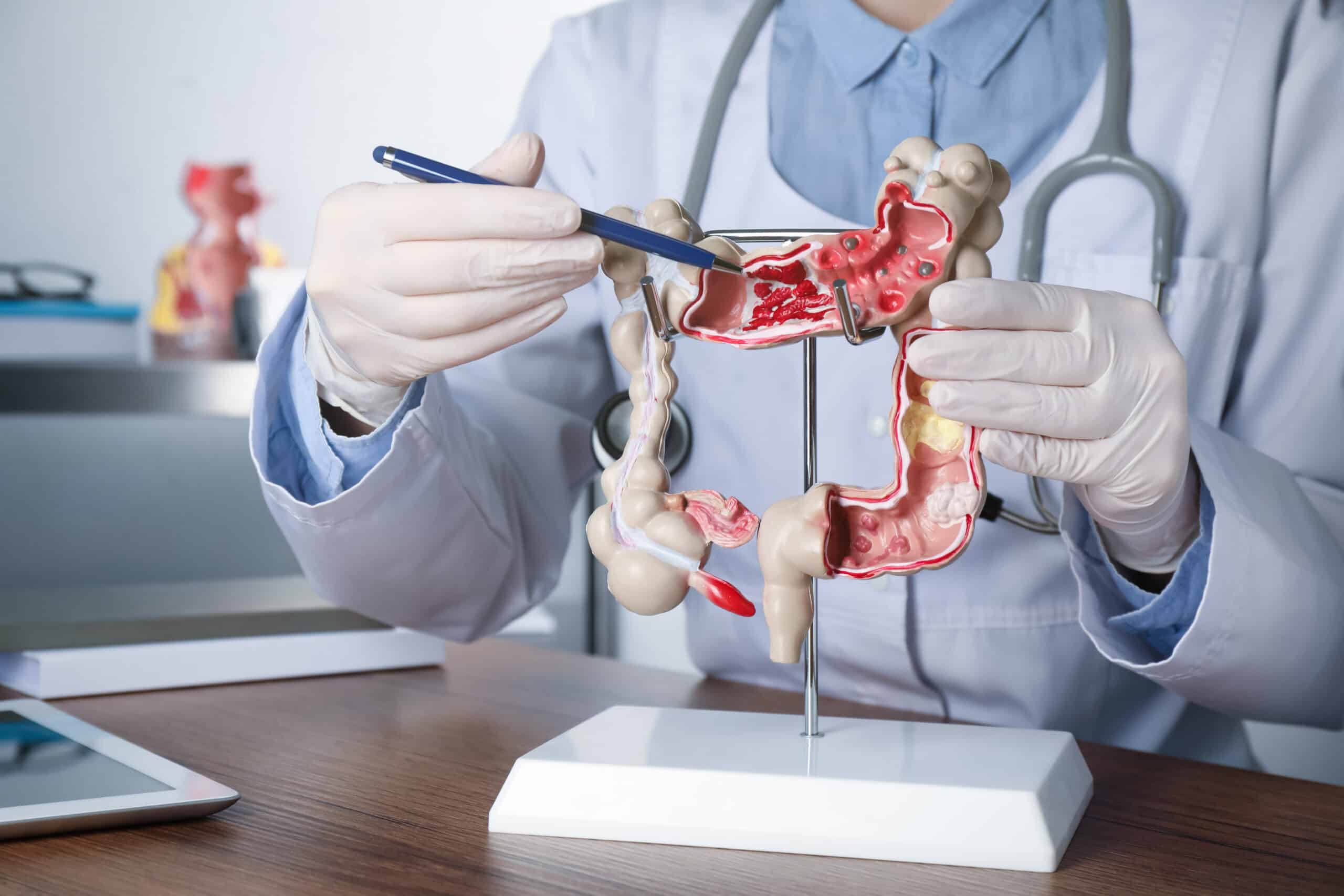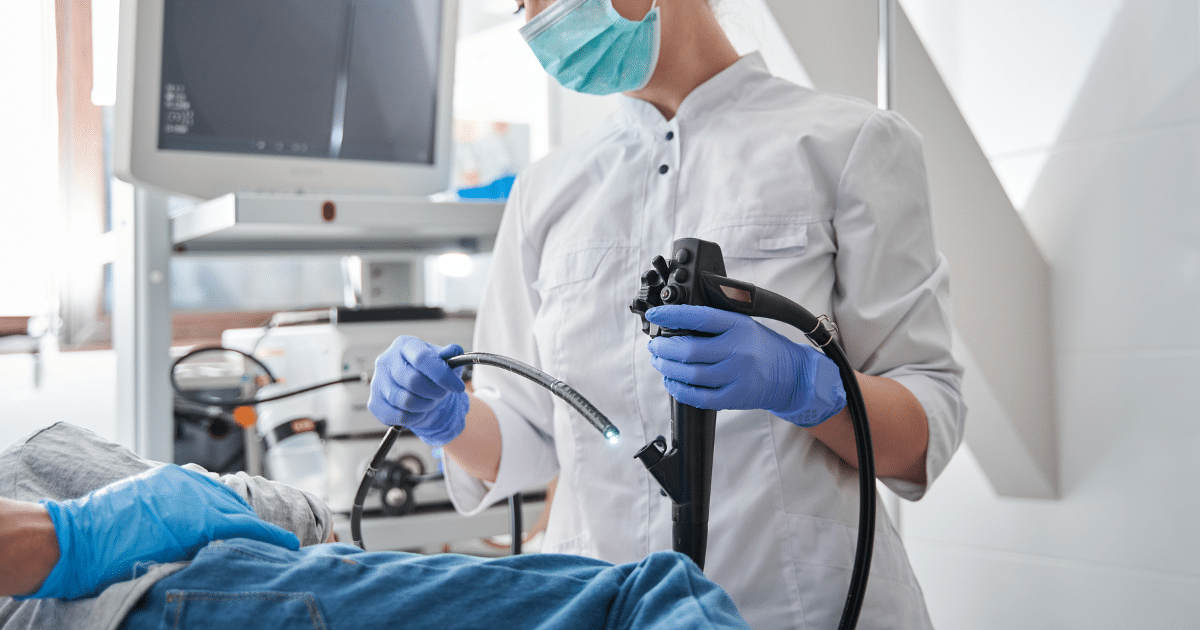Key Takeaways:
- Colon cancer is the fourth most common cancer in the U.S., with over 154,000 new cases expected in 2025.
- Early detection dramatically improves survival rates, making regular screenings and symptom awareness essential.
- Common colon cancer symptoms include rectal bleeding, unexplained weight loss, and changes in bowel habits.
- Less serious issues can cause many symptoms, but a doctor should evaluate persistent or worsening signs.
- PACT offers comprehensive colon cancer screenings in Connecticut, including colonoscopy and other testing options.
Colon cancer is the fourth most common type of cancer diagnosed in the United States, after breast, prostate, and lung cancer. In 2025, the National Cancer Institute estimates that 154,270 Americans will receive a colon cancer diagnosis, and 52,900 will pass away due to the disease.
Like other types of cancers, colon cancer is much more treatable if caught early, before the cancer spreads. Regular colon cancer screenings — and awareness of the warning signs of colon cancer — can help you detect potential problems before they become serious.
Why Recognizing Symptoms Early is Critical
Colon cancer is often called a “silent killer” because it typically doesn’t cause any symptoms in the early stages. Routine colon cancer screenings help find signs of cancer at an early stage, before symptoms even appear.
People have a much better chance of living at least five years after being diagnosed if their colon cancer is caught early. Unfortunately, most cases are found when the cancer has already spread. Survival rates vary greatly depending on how far the cancer has spread by the time it’s diagnosed:
- Localized: The cancer is only in the colon or rectum. When it’s found at this stage, 91.5% of people live at least five years after diagnosis.
- Regional: The cancer has spread to tissues close to the colon or rectum, such as the lymph nodes. When it’s found at this stage, the five-year survival rate drops to 74.6%.
- Distant: The cancer has spread to distant organs, like the liver, lungs, or brain. When colon cancer is diagnosed at this advanced stage, the chance of living at least five years drops to 16.2%.
Key Colon Cancer Symptoms to Watch For
Colon cancer symptoms can vary depending on where the cancer is located and its size. In the early stages, colon cancer often causes no symptoms. As the tumor grows, it can cause various symptoms in the abdominal or bowel region. These symptoms may be ignored or blamed on less serious issues, like hemorrhoids or a stomachache. Some key colon cancer symptoms to watch for include:
- Rectal bleeding or blood in the stool
- Unexplained weight loss
- Changes in your bowel habits, such as diarrhea or constipation
- Abdominal pain, bloating, or cramping
- The feeling that you didn’t empty your bowels
- Feeling unusually complete after eating
- Weakness or fatigue
- Developing iron deficiency anemia
When to Talk to a Doctor in Connecticut
Symptoms of colon cancer, such as bloating, diarrhea, and constipation, are common and can be caused by a wide variety of factors, including stress, a poor diet, and food intolerances. However, it’s essential to see a doctor to rule out severe conditions and begin treatment, if necessary.
Many people feel embarrassed about seeing a doctor for rectal symptoms, but doctors are trained to handle these topics professionally and without judgment. Don’t wait to seek medical attention if you have persistent symptoms, like constipation that lasts for more than two weeks or stomach discomfort that gets worse or doesn’t go away. A doctor should evaluate any rectal bleeding.
What to Expect During an Evaluation
When you see a Connecticut gastroenterologist for colon cancer symptoms, you can expect a thorough assessment. The doctor will start by asking questions about your symptoms, including when they started, how they’ve changed over time, and what makes the symptoms better or worse. They’ll also ask for details about other health conditions you have, and the conditions your family members have.
Next, the doctor will perform a physical examination to gather more information about your symptoms. For example, they may press on your abdomen to evaluate your organs or examine your anus with a finger or a small scope to look for problems like hemorrhoids.
Based on the results of your initial evaluation, your doctor may recommend further testing. This could include blood tests, imaging tests (like ultrasounds or CT scans), or colon cancer screening.
Colon Cancer Screening Options at PACT
The U.S. Preventive Services Task Force recommends routine colon cancer screening for all adults between 45 and 75, even if they don’t have any symptoms. Your doctor may recommend colon cancer screening before age 45 if you have colon cancer symptoms or a family history of the disease.
Colonscopy
Colonoscopy is considered the gold standard for colon cancer screening. During this procedure, your PACT physician will examine the lining of your colon and rectum through a flexible tube with a camera on its tip. If they find polyps — small growths that form on the lining of the colon — they can remove them during the procedure. Polyps are often harmless, but over time, some develop into colon cancer. Any polyps removed during the procedure can be sent to a pathologist for analysis.
Other Colon Cancer Screening Options
Colonoscopies are not the only colon cancer screening option. Other screening tests include blood tests that check for signs of colon cancer and stool-based tests that check the feces for possible signs of colon cancer, such as small amounts of blood in the stool. Virtual colonoscopies, which use CT scans to visualize the colon and rectum, may also be an option.
Some people find these other screening tests more convenient or easier than a colonoscopy. However, each test has its limitations, and abnormal results need to be followed up with a colonoscopy.
Looking for Colon Cancer Screening in CT?
Colon cancer is a severe disease, but catching it at an early stage significantly increases the chances of successful treatment. Routine colon cancer screening helps identify cancer at an early stage, even before symptoms occur. PACT Gastroenterology offers life-saving colon cancer screening for people throughout Connecticut, with offices conveniently located in Hamden, Guilford, and Milford. Talk to your doctor about the screening option that’s right for you and schedule your screening today.
FAQ: Colon Cancer Symptoms
Q: What are the first signs of colon cancer?
A: Early colon cancer often causes no symptoms. When symptoms do appear, they may include rectal bleeding, blood in the stool, changes in bowel habits, abdominal pain, bloating, unexplained weight loss, and fatigue.
Q: Can colon cancer symptoms be mistaken for other conditions?
A: Yes. Many colon cancer symptoms, such as constipation, diarrhea, or abdominal discomfort, can be caused by conditions like hemorrhoids, irritable bowel syndrome, or dietary issues. However, persistent or worsening symptoms should always be evaluated by a doctor.
Q: When should I see a doctor about colon cancer symptoms?
A: You should see a doctor if you experience persistent constipation or diarrhea lasting more than two weeks, ongoing stomach discomfort, unexplained weight loss, or any rectal bleeding. Early evaluation can lead to better treatment outcomes.
Q: How is colon cancer diagnosed if I have symptoms?
A: If you have colon cancer symptoms, your doctor may recommend a physical exam, blood tests, imaging tests, and a colonoscopy. A colonoscopy allows the doctor to view the colon lining and remove any suspicious growths for testing.
Q: Can colon cancer be prevented?
A: While not all cases are preventable, regular screenings, a healthy diet, regular exercise, and avoiding smoking and excessive alcohol can lower your risk. Removing polyps during colonoscopy can also prevent colon cancer from developing.







